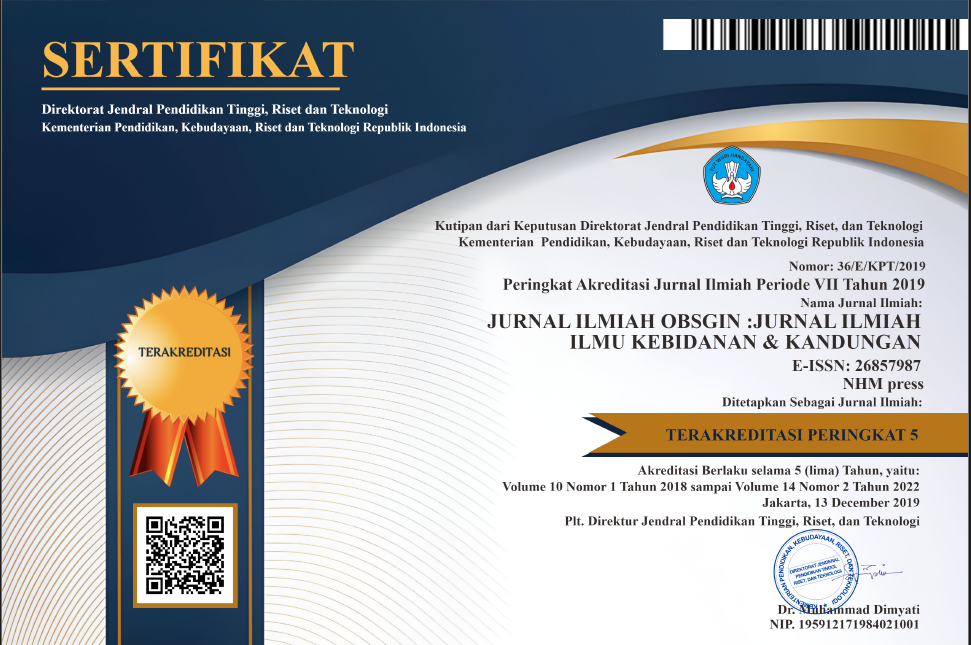PENGARUH RELAKSASI AUTOGENIK TERHADAP TINGKAT KECEMASAN IBU NIFAS DI PUSKESMAS PUTRI AYU KOTA JAMBI
Abstract
According to data from the World Health Organization, it is estimated that in 2020 as many as 20% of women at some time in their lives experience anxiety disorders. In Indonesia, it was found that the prevalence of postpartum anxiety was 28.7%. Primiparous mothers who experienced severe anxiety levels reached 83.4%. The initial survey at the Putri Ayu Health Center in Jambi City found that 7 out of 10 postpartum mothers had complaints that led to anxiety. This study is a pre-experimental design in the form of a one-group pretest-posttest design that aims to determine the effect of autogenic relaxation on the anxiety level of postpartum mothers at the Putri Ayu Health Center, Jambi City in 2021. The population of this study was 47 respondents. The sampling technique is accidental sampling. The sample of this study amounted to 32 respondents, based on the research criteria. The data analysis of this study was carried out univariate and bivariate using the paired t-test. Autogenic relaxation was performed 3 times for 3 consecutive days. After being given an intervention through an autogenic relaxation video, there was a decrease in the level of anxiety from an average of 30.63 to 26.00. Based on the results of the research on the pretest and posttest, having an average before (mean = 30.63) and an average after (mean = 26.00) with p-value (0.000) < 0.05 then Ho is rejected, Ha is accepted. This means that there is an effect of giving Autogenic Relaxation on the anxiety level of postpartum mothers at the Putri Ayu Health Center, Jambi City in 2021. There needs to be socialization and education about autogenic relaxation during pregnancy to prevent as early as possible the occurrence of anxiety in the postpartum period.
References
Brummelte, S. and Galea, L. A. M. (2010) ‘Depression during pregnancy and postpartum: contribution of stress and ovarian hormones’, Progress in Neuro-Psychopharmacology and Biological Psychiatry, 34(5), pp. 766–776.
Dias, C. C. and Figueiredo, B. (2020) ‘Mother’s prenatal and postpartum depression symptoms and infant’s sleep problems at 6 months’, Infant Mental Health Journal, 41(5), pp. 614–627.
Farada, R. A. (2011) Pengaruh teknik relaksasi autogenik terhadap tingkat kecemasan pada ibu primigravida trimester III di wilayah kerja puskesmas Kotakulon Kabupaten Bondowoso.
Haruyama, S. (2011) ‘The miracle of endorphin: Sehat mudah dan praktis dengan hormon kebahagiaan’, Bandung: Penerbit Kaifa.
Husen, K., Wardani, N. D. and Puspitasari, V. D. (2017) ‘PENGARUH PEMBERIAN KONSELING INDIVIDU SEBELUM MELAHIRKAN TERHADAP TINGKAT KECEMASAN PADA IBU POSTPARTUM’. Faculty of Medicine.
Iwanowicz-Palus, G. J., Marcewicz, A. E. and Bień, A. M. (2020) ‘Analysis of Determinants of Postpartum Mood Disorders’, BMC pregnancy and childbirth. doi: https://doi.org/10.21203/rs.3.rs-108771/v1.
Kemenkes RI (2018) Hasil utama RISKESDAS 2018, Kementerian Kesehatan Badan Penelitian dan Pengembangan Kesehatan. Jakarta. Available at: https://kesmas.kemkes.go.id/assets/upload/dir_519d41d8cd98f00/files/Hasil-riskesdas-2018_1274.pdf.
Kenwa, P., Karkata, M. K. and Triyani, I. G. A. (2015) ‘pengaruh pemberian konseling terhadap depresi post partum di Puskesmas II dan IV Denpasar Selatan’, Coping Ners Journal, 3(2), p. 1.
Lestari, E. and Sholihah, A. N. (2017) ‘Hubungan antara paritas dengan tingkat kecemasan yang dialami ibu pada masa post partum di rs pku muhammadiyah yogyakarta’.
Manalu, A. B. et al. (2021) ‘PENGARUH PEMBERIAN RELAKSASI AUTOGENIK TERHADAP TINGKAT KECEMASAN IBU PRIMIGRAVIDA DI BPM KURNIA KECAMATAN DELI TUA KABUPATEN DELI SERDANG’, Jurnal Doppler, 5(1), pp. 6–13.
Mawardika, T., Aniroh, U. and Lestari, P. (2020) ‘Penerapan relaksasi otot progresif terhadap penurunan kecemasan ibu post partum’, Jurnal Keperawatan, 12(2), pp. 277–286.
Molgora, S. and Accordini, M. (2020) ‘Motherhood in the time of coronavirus: the impact of the pandemic emergency on expectant and postpartum women’s psychological well-being’, Frontiers in Psychology, 11.
Nanjundaswamy, M. H. et al. (2020) ‘COVID-19-related anxiety and concerns expressed by pregnant and postpartum women—a survey among obstetricians’, Archives of Women’s Mental Health, 23(6), pp. 787–790.
Potter, P. A. and Perry, A. G. (2010) Fundamental Keperawatan, Buku 3. Jakarta: Salemba Medika.
Pratama, B. (2017) ‘Pengaruh Relaksasi Otot Progresif Terhadap Penurunan Tingkat Kecemasan Pada Ibu Bersalin Fase Laten Di Rsu Pku Muhammadiyah Bantul Yogyakarta’. STIKES Jenderal Achmad Yani Yogyakarta.
Pratiwi, D. M., Rejeki, S. and Juniarto, A. Z. (2021) ‘Intervention to Reduce Anxiety in Postpartum Mother’, Media Keperawatan Indonesia, 4(1), pp. 62–71.
Rosida, L., Imardiani, I. and Wahyudi, J. T. (2019) ‘Pengaruh Terapi Relaksasi Autogenik Terhadap Kecemasan Pasien Di Ruang Intensive Care Unit Rumah Sakit Pusri Palembang’, Indonesian Journal for Health Sciences, 3(2), pp. 52–56.
Saunders, S. (2007) ‘Autogenic therapy: Short term therapy for long term gain’, British Autogenic Society, Chairman http://www. Autogenic-therapy. org. uk.
Suzuki, S. (2020) ‘Psychological status of postpartum women under the COVID-19 pandemic in Japan’, The Journal of Maternal-Fetal & Neonatal Medicine, pp. 1–3.
Trisetyaningsih, Y., Pratama, B. and Rohmani, N. (2018) ‘PENGARUH RELAKSASI OTOT PROGRESIF TERHADAP PENURUNAN TINGKAT KECEMASAN PADA IBU BERSALIN FASE LATEN’, JURNAL KESEHATAN SAMODRA ILMU, 9(2), pp. 135–145.











